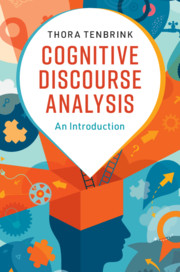Book contents
- Cognitive Discourse Analysis
- Cognitive Discourse Analysis
- Copyright page
- Contents
- Figures
- Tables
- Preface
- Acknowledgements
- Introduction
- 1 Background and Scope
- 2 Language as a Representation of Thought
- 3 Resources
- 4 Identifying Cognitive Orientation
- 5 Identifying Cognitive Depth
- 6 Identifying Cognitive Constructiveness
- 7 Using Language to Convey Thoughts
- 8 CODA Procedures
- 9 Beyond CODA
- Register of Linguistic Features
- References
- Index
1 - Background and Scope
Published online by Cambridge University Press: 23 January 2020
- Cognitive Discourse Analysis
- Cognitive Discourse Analysis
- Copyright page
- Contents
- Figures
- Tables
- Preface
- Acknowledgements
- Introduction
- 1 Background and Scope
- 2 Language as a Representation of Thought
- 3 Resources
- 4 Identifying Cognitive Orientation
- 5 Identifying Cognitive Depth
- 6 Identifying Cognitive Constructiveness
- 7 Using Language to Convey Thoughts
- 8 CODA Procedures
- 9 Beyond CODA
- Register of Linguistic Features
- References
- Index
Summary
Chapter 1 has three goals. First, it provides motivation and history for the methodology by reviewing seminal insights and current debates about the relationship between language and thought, outlining how most research in this field concerns the structure of language rather than its use. Second, it outlines the scope for using CODA by identifying crucial and typical areas of application, with specific focus on mental representations and cognitive processes. Third, it highlights the scope and limits of language analysis of this kind, along with a discussion of reliability and generalisability of insights gained by using CODA. Altogether, the chapter provides in-depth insights into the foundational insights the method builds on, what it is intended for, why and where it is useful, and how it relates to other approaches to cognition.
Keywords
- Type
- Chapter
- Information
- Cognitive Discourse AnalysisAn Introduction, pp. 7 - 31Publisher: Cambridge University PressPrint publication year: 2020

